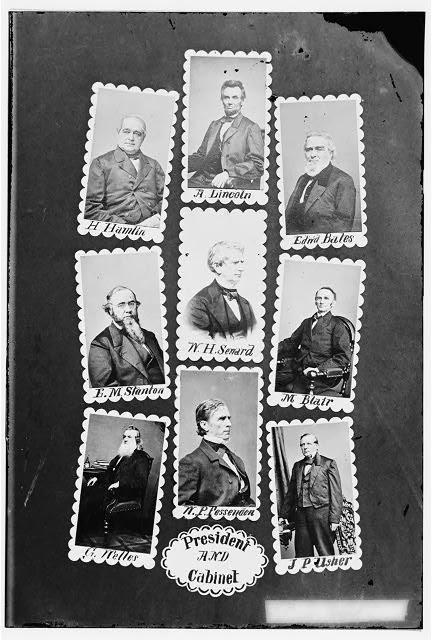Presidents Lincoln and Kennedy are forever linked in history -- through their stands on civil rights, by their courage in the face of existential national threats, and tragically as victims of gun violence.
 |
| William Pitt Fessenden, date unknown. (National Archives) |
John F. Kennedy quotes Fessenden at the very end of his "Profiles in Courage," reviewed last week on Navy Reads. Fessenden's words chosen by JFK in "Profiles" were written three years after Lincoln delivered the Emancipation Proclamation and the Gettysburg Address.
Fessenden spoke the words as a Senator, but they can apply to anyone in public leadership positions. The words ring strong today in the context of Navy's core values of honor, courage and commitment:
"When, Mr. President, a man becomes a member of this body, he cannot even dream of the ordeal to which he cannot fail to be exposed;
- of how much courage he must possess to resist the temptations which daily beset him;
- of that sensitive shrinking from undeserved censure which he must learn to control;
- of the ever-recurring contest between a natural desire for public approbation and a sense of public duty;
- of the load of injustice he must be content to bear, even from those who should be his friends;
- the imputations of his motives;
- the sneers and the sarcasms of ignorance and malice;
- all the manifold injuries which partisan or private malignity, disappointed of its objects, may shower upon his unprotected head.
All this, Mr. President, if he would retain his integrity, he must learn to bear unmoved, and walk steadily onward in the path of duty, sustained only by the reflection that time may do him justice, or if not, that after all his individual hopes and aspirations, and even his name among men, should be of little account to him when weighed in the balance against the welfare of a people of whose destiny he is a constituted guardian and defender."Fessenden served in both the House of Representatives and Senate before President Lincoln convinced him to fill the Treasury position vacated by the prideful Salmon P. Chase, as described in Doris Kearns Goodwin's "Team of Rivals."
"Fessenden's appointment received immense praise. 'He is a man of undoubted financial ability, and of unsurpassed personal integrity,' the Chicago Tribune wrote."
 |
| Lincoln portrait by George P.A. Healy, 1869 in State Dining Room, Kennedy White House, 1961. |
"The act created a national currency and altered the monetary structure of the United States. It asserted national sovereignty to help win a war fought to preserve that sovereignty. It provided the Treasury with resources to pay its bills, it restored investor confidence to make possible the sale at par of the $500 million of new 6 percent bonds authorized at the same time, and unlocked the funds that had gone into hoarding during the financial crisis of December."McPherson reviewed Kearns Goodwin's book for the New York Times in 2005, calling it "an elegant, incisive study of Lincoln and leading members of his cabinet that will appeal to experts as well as to those whose knowledge of Lincoln is an amalgam of high school history and popular mythology."
In "Team of Rivals" Kearns Goodwin dives into White House and congressional intrigue and shows Lincoln's mastery in balancing power and personalities. She shows that Lincoln judged Fessenden to be a statesman worthy of trust and respect. And the feeling was mutual.
"By the spring of 1865 the treasury was stable, and when Maine reelected him to the Senate for a term to being on March 4, Fessenden felt free to resign."
"Lincoln was sorry to lose his brilliant, hardworking secretary. Fessenden, too, 'parted from the President with regret.' During his tenure at the Treasury, his initial critical attitude toward Lincoln had been transformed into warm admiration. 'I desire gratefully to acknowledge the kindness and consideration with which you have invariably treated me,' he wrote to the president, 'and to assure you that in retiring I carry with me great and increased respect for your personal character and for the ability which has marked your administration.' Noting that the 'prolonged struggle for national life' was finally nearing a successful conclusion, he went on, 'no one can claim to have so largely contributed to the chosen chief magistrate of this great people.'"
 |
| President Kennedy signs joint resolution March 1, 1961 commemorating the 100th Anniversary of the First Inauguration of President Abraham Lincoln. (JFK Presidential Library) |
Fessenden became the "guardian and defender" of the Constitution he wrote about in his excerpt in JFK's "Profiles." Like other true patriots in public service his primary concern was the long-term health of the republic rather than short-term political expediency and personal profit.


No comments:
Post a Comment